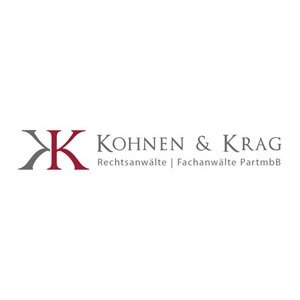Best Employment Rights Lawyers in Germany
Share your needs with us, get contacted by law firms.
Free. Takes 2 min.
Or refine your search by selecting a city:
List of the best lawyers in Germany
About Employment Rights Law in Germany
Germany has a robust and comprehensive framework for employment rights, intended to protect both employees and employers. This framework is governed by a variety of laws that cover everything from contracts and termination to working hours and safety standards. Essential pieces of legislation include the German Civil Code (BGB), the Federal Holiday Act, and the German Working Time Act. These laws ensure fair treatment, safety, and adequate compensation for employees while specifying the rights and responsibilities of employers. Understanding employment rights in Germany is crucial for both employees and employers to maintain a fair and productive workplace environment.
Why You May Need a Lawyer
While many employment-related issues can be resolved without legal assistance, there are certain situations where consulting a lawyer becomes necessary. These might include unfair dismissal, discrimination in the workplace, disputes over salary or overtime, issues with employment contracts, or problems regarding workplace safety. A lawyer specialized in employment law can help you understand your rights, represent you in disputes, and guide you through legal proceedings ensuring your interests are protected.
Local Laws Overview
The local laws surrounding employment in Germany dictate several key aspects essential for both employees and employers. The Employment Protection Act governs termination of employment, providing job security. The Working Hours Act regulates maximum working hours and breaks to ensure a healthy work-life balance. Minimum wage regulations guarantee fair compensation, while anti-discrimination laws foster an inclusive workplace. The Works Constitution Act allows employees to participate in workplace decision-making through works councils, and the Vocational Training Act is noteworthy for encouraging skill development.
Frequently Asked Questions
What is the probation period for employees in Germany?
In Germany, the probation period often lasts for six months. During this time, both employer and employee can terminate the contract with a two weeks' notice.
What is the legal working hour limit in Germany?
The standard working limit is 48 hours per week, as per the German Working Time Act. Exceptions are possible, but they require specific approval.
Are employees entitled to paid leave?
Yes, full-time employees are entitled to at least 24 working days of paid leave per year under the Federal Holiday Act.
What are the maternity leave provisions in Germany?
Expectant mothers are entitled to maternity protection, which includes 14 weeks of paid leave - 6 weeks before the expected date of birth and 8 weeks after.
Can an employer terminate employment without notice?
Termination without notice is only permissible under exceptional circumstances, such as gross misconduct. Normally, a notice period must be observed.
What constitutes workplace discrimination?
Discrimination based on race, gender, disability, religion, age, or sexual orientation is prohibited by the General Equal Treatment Act (AGG).
What is the minimum wage in Germany?
The minimum wage is adjusted regularly and is set by the Minimum Wage Act. As of 2023, it is EUR 12 per hour.
Is paid overtime mandatory?
Employees must be compensated for overtime work as per contractual agreements, which may involve additional pay or time off.
Can employees request part-time work?
Employees have the right to request part-time work and employers must accommodate these requests unless there are compelling business reasons not to.
Do employees have whistleblower protection?
Whistleblower protection is provided under specific conditions to encourage reporting of workplace misconduct or illegal activities.
Additional Resources
For further information on employment rights in Germany, you can reach out to several organizations and regulatory bodies. The Federal Ministry of Labour and Social Affairs offers a wealth of resources and guidance on employment law. The Federal Employment Agency provides support for job-related concerns, including unemployment benefits. Additionally, trade unions often offer legal advice and support for their members in employment matters.
Next Steps
If you find yourself needing legal assistance regarding employment rights in Germany, it is prudent to consult with a lawyer specializing in employment law. Begin by documenting all relevant details of your situation and gather any pertinent documents such as contracts or written communications. Contact a legal professional to discuss your case and receive tailored advice. You may also consider seeking initial advice from your local trade union if you are a member.
Lawzana helps you find the best lawyers and law firms in Germany through a curated and pre-screened list of qualified legal professionals. Our platform offers rankings and detailed profiles of attorneys and law firms, allowing you to compare based on practice areas, including Employment Rights, experience, and client feedback.
Each profile includes a description of the firm's areas of practice, client reviews, team members and partners, year of establishment, spoken languages, office locations, contact information, social media presence, and any published articles or resources. Most firms on our platform speak English and are experienced in both local and international legal matters.
Get a quote from top-rated law firms in Germany — quickly, securely, and without unnecessary hassle.
Disclaimer:
The information provided on this page is for general informational purposes only and does not constitute legal advice. While we strive to ensure the accuracy and relevance of the content, legal information may change over time, and interpretations of the law can vary. You should always consult with a qualified legal professional for advice specific to your situation.
We disclaim all liability for actions taken or not taken based on the content of this page. If you believe any information is incorrect or outdated, please contact us, and we will review and update it where appropriate.
Browse employment rights law firms by city in Germany
Refine your search by selecting a city.















